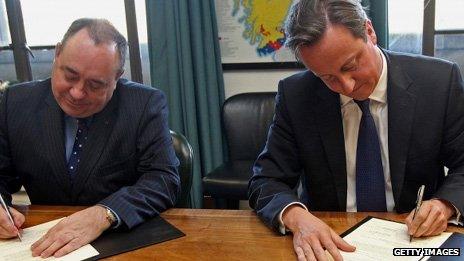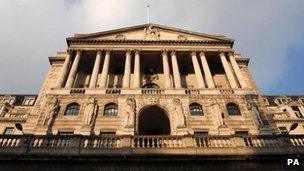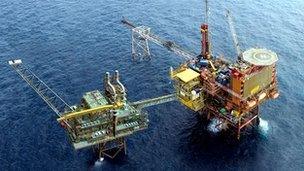Scottish independence: more information or more questions?
- Published

The book attempts to help Scots decide what kind of economy they are signing up for, whether they vote yes or no
The announcement of the referendum date earlier this month brought forth one mighty message from the Great Undecideds: "we want more information".
That's a tricky demand for the campaign teams, and for those of us in the media, as it's not that easy to set out "information" about the unknown - whether that's the unknown of a new constitutional status or the unknowns of staying within the UK.
In only one day this week, we got three new unknowns. The Scottish Tories re-opened the door to the transfer of further powers. There was continued delay, until after Scotland's referendum, to Downing Street's decision on whether the Northern Ireland Assembly can have corporation tax powers with which to compete with Dublin's.
What does that tell Scottish voters about the chances of more devolved powers post-referendum?
And third, The Scotsman's owners have cut costs and quarter of journalists' jobs, underlining one of the paradoxes of the independence referendum campaign - that the existence of the country's distinctive newspaper industry is in doubt, at a time when a vibrant media is more important than ever.
Mighty tome
So it's with impeccable timing that a mighty tome dropped this week, and with a thud: 330 pages of book called "Scotland's Future: the Economics of Constitutional Change", providing a guide to the economic dimensions of the big choice facing Scotland on 18 September 2014.
It's not the first such contribution, but its writers have significant firepower, and can stake a reasonable claim to impartiality. Whatever their backgrounds, they go to considerable lengths to set out the options from a neutral point of view.
They have asked not only about the economy of an independent Scotland, but also posed some challenging questions of the options for Scotland if there's a 'no' vote.
The main mover behind this project, and its editor, is Andrew Goudie.
Until last year, he was chief economic adviser to the Scottish government, as well as the top civil servant running the finance and enterprise end of the administration.
He's since found a new academic berth at Strathclyde University.
He has pulled in contributions from his former bosses; Lord Gus O'Donnell, former Cabinet Secretary in Downing Street, and Sir John Elvidge, former permanent secretary at St Andrew's House.
He's also drawn in academics, including Prof Alex Kemp, the guru of North Sea oil, Prof John Kay on the tricky issue of currency, and Prof Charles Goodhart, former member of the Bank of England's monetary policy committee.
'Cavalier assertions'
Andrew Goudie has been scathing of the "cavalier assertions with little or no foundation" which characterise much of the independence debate so far. His book's response is not to provide the information craved by those responding to last week's date-naming, but to keep asking yet more questions, piling up with new challenges at the end of each chapter.

The Bank of England would play an important role in negotiations
Across each chapter, the same problem keeps cropping up: data is scarce and comparisons are of only limited help as a guide.
Data about Scotland's current position is no guide to its behaviour if it were independent. There are repeated questions of where the new opportunities lie that Scotland is not now capable of exploiting. This underlines that there's so much cannot possibly be known ahead of the vote.
There are questions as to whether existing powers at Holyrood are already being fully utilised.
And above all, the authors set out the constraints that exist for any independent country, new or old - constraints that would compromise that independence.
Sterling zone
There's lots to take from this book, for both sides of the debate, and for those hoping to find more clarity. Here are just some. (Apologies if this is at some length, but this is an important contribution to an important debate.)
John Kay, who was on Alex Salmond's Council of Economic Advisers, makes clear that, without its own currency, there would be big compromises in economic policy.
A monetary union with the rest of the UK would be the best outcome, he argues, if it were possible to negotiate a deal that retained the fiscal flexibility that independence implies. "But that caveat may be impossible to fulfil," writes Kay.
Under an agreement with Westminster to use sterling, Kay argues it's hard to see why the residual, or rest of, the UK (RUK) would accept deficit or debt levels in Scotland that are significantly higher than those set by the Treasury in London.
And an independent Scotland could reasonably expect London to avoid the profligacy it's shown in the past five years. Or could it?
"It is easy to see why the RUK, representing 91.5% of a monetary union, might seek oversight of the economic affairs of Scotland," writes Kay. "It is more difficult to see why RUK should conceded oversight over its policies to Scotland, representing 8.5% of the union.
"But in the absence of such reciprocity, the degree of autonomy Scotland would enjoy in fiscal policy might differ very little from the modest amount Scotland currently enjoys under the allocation of a block grant within the UK."
The professor says a more genuine independence would require a separate currency - an option he suggests nationalists should keep open. Denmark and Sweden continue to have their own kroners, and they make them work. But Kay points out that living next to the eurozone, and trading with it as part of the EU, means their room for manoeuvre is inevitably limited.
Animal spirits
Then here's a big question, addressed by Kim Swales and Peter McGregor, economics professors at Strathclyde University: would the Scottish economy grow faster under independence?
They're not saying "'yes" or "no", but that the evidence is very hard to find either way. While government could aim to support the key elements that help growth - labour productivity, the proportion of adults in the labour market, and the overall population - the unknown ingredient could be an "independence stimulus", or "through a release of animal spirits" (not intended to insult, this is economist-speak for the inexplicable or irrational ways in which people sometimes act).

Animal spirits may determine whether Scotland becomes a Celtic tiger
Swales and McGregor are concerned about the difficulties of devolving more tax powers within a unified state, and highlight the flexibility the Scottish Parliament already has.
And they highlight a "significant risk" from the effect of having an international border in hindering trade.
The border with most research into it is the 49th parallel between the US and Canada. Of course, these countries were never integrated within the same country and with the same currency. But despite much in common in their economies and language, they tend to buy and sell internally. It's reckoned that, if the international border didn't exist, there could be 44% more trade between America and its new, northern, 51st state.
"There is a risk that introducing a border will reduce trade, and this would impact much more seriously on the Scottish economy than on the economy of the rest of the UK," write Swales and McGregor.
And if Scotland becomes more self-contained as an economy (the way, for instance, that the Scottish government urges food shoppers to buy local) there could be a hindering effect on growth and innovation resulting from reduced competition and variety.
Fairer or wealthier?
On borrowing costs for an independent Scotland, Prof Goodhart has to look to the Basque country to find any parallel, however imperfect.
That points to an extra one percentage point on interest rates for the higher risk that comes with being small and in an illiquid part of the government bond market.
And what are the prospects for Scotland reversing the growing inequality of Britain in recent years - a favourite rallying cry of the "Yes Scotland" campaign?
Lord O'Donnell says Scotland could, indeed, choose to adopt policies intended to reverse that trend. But he warns it may not be as simple as some think.
If the Scottish Parliament chooses to tax more for better equity outcomes, it could be at the expense of less efficient use of funds, or of economic growth.
He reflects, with evident exasperation, at the complexity of a tax system over which he used to have considerable influence, warning that the power of vested interests and of the status quo tend to bear down on wannabe reformers.
"In theory, Scotland could do better," he writes. "But the political forces that have added complexity and inefficiency to the system are likely to be just as prevalent in Scotland as in the UK."
Lord O'Donnell also asks some important questions about what follows a "no" result, if Scots then ask for more powers. The vital one: why would the rest of the UK be willing to devolve more tax powers?
His answer: it's in the interests of the rest of the UK to have a flourishing Scotland, but not if it's at the expense of tax revenues in England, Wales and Northern Ireland. The risk of competitive tax cutting between parts of the UK is "a race to the bottom".
"Everyone wants to spend more and tax less, and at the national level, that does not add up to a sustainable fiscal policy."
Offshore winds
Then, there's oil and gas. It has taken centre stage in the referendum campaign in recent weeks. On the most recent disputes, Prof Kemp sides with the Scottish government in challenging the outlook of the Office of Budget Responsibility as being unduly pessimistic.

There are questions to be asked about oil and gas revenues, whatever the referendum result
He goes through the complexities of setting up an independent regime for regulating oil and gas, and points to challenges in the future, notably of balancing the desire for big revenue with the need to incentivise oil companies to keep drilling and producing.
The word "volatility" keeps cropping up around the price and tax revenues, with Kemp another of several voices recently to urge an independent Scotland not to rely on oil and gas tax to balance its books (as it would have to do at current spending levels), but to set up an oil fund instead.
And Alex Kemp has some interesting observations on how a "no" vote on independence could open the door to different devolved arrangements for oil and gas.
There are plenty precedents for parts of countries having powers over oil, or sharing them, mainly in federal systems such as Canada's.
There could be change to the current system of centralised taxation and licensing controls in London. But apart from unpicking decades of entrenched thinking in the Treasury, that could require transfer of powers over regulation and licensing if it is to avoid confusion. So there are big challenges in there for those wanting to argue for more powers within the UK.
Testing times
In drawing together the strands of these analyses, Andrew Goudie poses six tests of economic policy:
1 - Would constitutional change provide opportunities that don't currently exist?
2 - How compatible is the Scottish economy with the rest of the UK, and how would instability between these two be managed?
3 - How would the Scottish economy become more competitive?
4 - How resilient would Scotland be if it faced further global shocks?
5 - How would Scotland manage the risk of the unexpected if it had more powers?
6 - Would the constitutional change be economically and financially stable?
While this is a long way from the more emotional question of identity, in the economic debate about Scotland's future these are all reasonable questions to put to both nationalists and to those who want more powers within the UK?
There will be answers, for sure, and it's up to voters to satisfy themselves that the answers are adequate.
Unfortunately, many of the answers will lack that sought-after ingredient of "information".